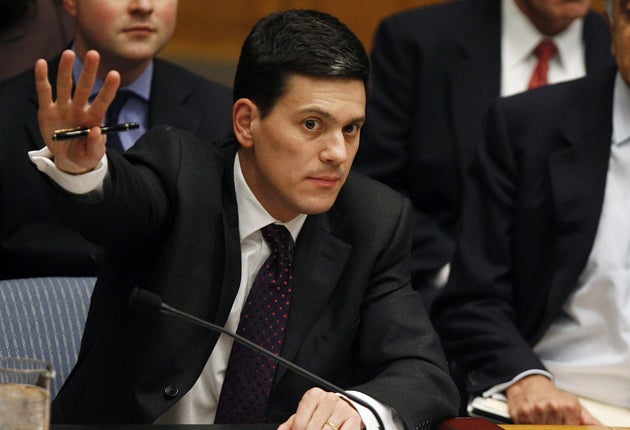Could it be Miliband – and not Blair – for Europe?
World Focus: The EU

The dark clouds that have gathered around Tony Blair's hopes of becoming EU President could yet reveal a silver lining for a younger British hopeful. Murmurs that David Miliband could be in the running for the number two post of EU high representative have grown louder in the past few days, amid tentative hopes nominations could be announced during next week's nail-biting summit in Brussels next week.
The post of de facto EU foreign minister might not at first glance convey the grandeur of the presidential function, but it could become far more prominent if EU leaders opt for a low-key figure for the President's role. Several European capitals have made it known recently that far from wanting a high-charisma – and controversial – candidate like Tony Blair to become the EU's public face in the world, they would prefer a more demure personality to act as go-between and compromise-broker among the EU's 27, often-bickering, member states.
More palatable (though lamentably uninspiring) rivals to Blair include Jan Peter Balkenende, the Dutch Prime Minister, or Finland's Paavo Lipponen. Both belong to resolutely pro-European member states and are not tarnished by the Iraq war. "If they want the President to be a mild-mannered eurocrat rather than a bold statesman, that would leave more room to appoint a more high-profile figure as foreign minister," says one EU diplomat.
Yesterday Mr Miliband of course denied he was interested in swapping London for Brussels. "I'm not running for the Europe high rep job," he tweeted, "I'm the Foreign Sec thank you very much – fully booked".
These protestations aside, his nomination would have plenty going for it. At 44, he is one of the younger and more dynamic foreign ministers on the EU block and his popularity is reflected in the chorus of positive sound-bites from European diplomats, who have this week waxed lyrical about his "intelligence", "values" and "analytical skills" to the British contingent of the Brussels press corps.
Miliband has also ruffled fewer feathers than other wannabes, such as Sweden's Carl Bildt, whose strong record abroad is undermined by his regular tirades against Russia. "He did get off to a rocky start in Brussels, where some perceived him to be too young and cocky and a tad disrespectful. But he's earned a lot of respect since then," says Daniel Korski, a senior fellow at the European Council on Foreign Relations. "He's also one of the most pro-European ministers around."
A pet project of Mr Miliband's has been the creation of a far more robust and centralised foreign policy outfit for the EU. The European External Action Service – part of the Treaty of Lisbon and due to come into force next year – would effectively do away with the current messy patchwork of EU departments to create one foreign office with 5,000 diplomatic staff, some of whom would be despatched to newly-created EU embassies around the globe.
Mr Miliband's professed lack of interest might not be the only stumbling block. The EU's enlargement commissioner Olli Rehn, who oversaw the entry of 12 new member states, enjoys universal approval and is widely seen as the front-runner for the post. It has also been reported that Angela Merkel, the German Chancellor, would prefer to see a woman in the job. "Right now, it's a carousel of rumours and speculation. There is still everything to play for," said one British official in Brussels.
Mr Miliband's appointment is of course conditional on Tony Blair's failure. In fact, some British cabinet ministers yesterday dismissed the whole Miliband furore as an attempt by Blair opponents to kill off his candidacy.
The carousel of speculation could continue for a while yet. The EU is still waiting for the Czechs to ratify the Lisbon Treaty. Yesterday there seemed to be a more conciliatory mood from Prague, with President Vaclav Klaus hinting that his concerns had been dealt with. But the Czech head of state is hard to predict and could still grand-stand long enough during next week's summit for the nominations to have to be delayed until November.
On Monday, Mr Miliband is set to give a speech setting out his vision for the EU's meatier role on the world stage. He may now struggle to make clear that his interest in the new "EU Foreign Office" is not tied to any interest in becoming its boss.
Join our commenting forum
Join thought-provoking conversations, follow other Independent readers and see their replies
Comments